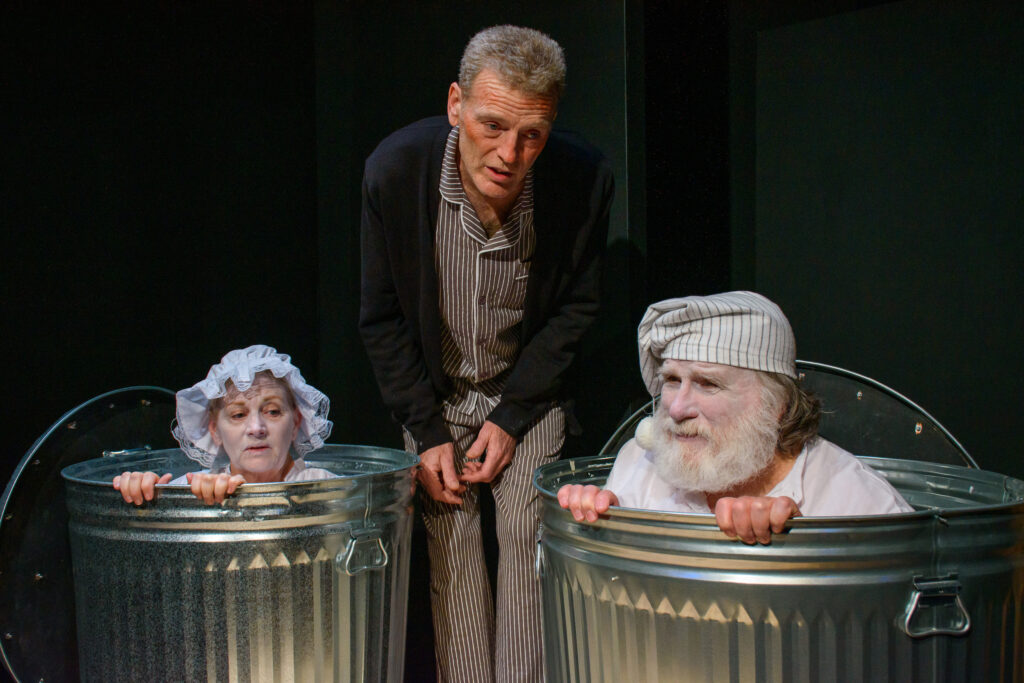 "Hamm" played by Bo Roberts in Samuel Beckett's 'Endgame'
"Hamm" played by Bo Roberts in Samuel Beckett's 'Endgame'
‘Endgame’ by Samuel Beckett & Directed by Frédérique Michel @ City Garage Theatre
In a wild and dreamy tension between the occupation of the real-world with other human life in it and our private inner-life, Endgame by Mr. Samuel Beckett portrays a meditation on what plays a more significant role in our very own humanity? Prima facie, the world which involves conducting ourselves appropriately with others is necessary, and even in fact primary, to being man. As Aristotle remarked, man is political by nature; which presupposes he is social by nature. To let, then, our inner world come to dominate the stage, is, intuitively, unhealthy. And indeed, time and time again, when the mind is lost, it is lost in its preference for an illusory world self-contained in the imagination of the person.
It is this illusory world which is charming to have elaborated for us. This world, which is conscious of its distinction with the “land of the living”; It is knowingly isolated, secluded, secreted away from the minds of others. And yet, in its seclusion, it is rampant in its craven desires for attention.
Of course, not all the imaginary figures are so thirsty for being the center of attention. Hamm, however, played by the brilliantly phlegmatic Bo Roberts, is mendaciously coy in his endless taste for being the reigning authority in his dominion. Perhaps the person he is necessarily contained within is too agreeable to the erstwhile pathological nature of the imagination in desperate – though keenly blind to its destitution – suction of the life-force of the character he is seeking to wholly absorb – to the detriment of both. The inner-life that the protagonist of Clov, played sharply by Troy Dunn, succumbs to has its own cosmic drama with the discovery of vividly fictional, nay magical, characters who sleep in tin cans and are, in fact, the parents of Hamm himself! What nonsense!

From left to right: Nell (Martha Duncan), Clov (Troy Dunn), Nagg (Andy Kallok) in ‘Endgame’ by Samuel Beckett directed by Frédérique Michel.
Nonsense. That is what, I believe, the playwright is seeking to confront the audience with. The dialogue has a quickness to it, without being torrentially emotional, i.e. histrionic. Indeed, Hamm had all the availability in his character’s repository for the character to be as violently loud as he is loquacious. And yet, wisely, we have an unseemly balancing act between a mental vampire and a soft, though not calculating, approach to his paternalistic authority over both his parents and the person he is saturating – to the point of an exclusive hermeticism which captures the stage.
Mr. Beckett, though, is again smart not to tempt us with a despondent reckless abandonment; a simple rendering of a person losing control of his mind until the bitter truth is swallowed by the audience. And perhaps, in the whirring of such quizzical dialogue, we have the strength of the playwright and particularly the direction by Frédérique Michel, to provide a healthy dose of temperance to the range in which the actors express their craft. A much more naïve playwright would be thunderous with the opportunities to present us the idea of a dissociation from the world of others – the land of the living.
It is ultimately, then, this tension between our base need to relate to others, and the engrossment of that bare necessity into the conceptualizing of worldly plans, to ultimately foment such a rich imagination which ends up, judging by the well-adjusted, corrupting the humanity that sustains it. We are almost left with a sense of pondering what imagination is good for if it leads to such ruin? To open our minds to explore possibilities unimaginable!
Yes, they must be metered, which is the difficulty in moving in a world which is exclusive, and one which is universal. It is in imbuing the universal with more magic and harmony and less drudgery and harm which obligates one to principle one’s inner life toward including, obsessing over, universal principles. This is what separates Clov from a Mssr. Rene Descartes, Sir Isaac Newton, Herr Leonard Euler. Or in other words, the saintly genius from the damnly mad.

